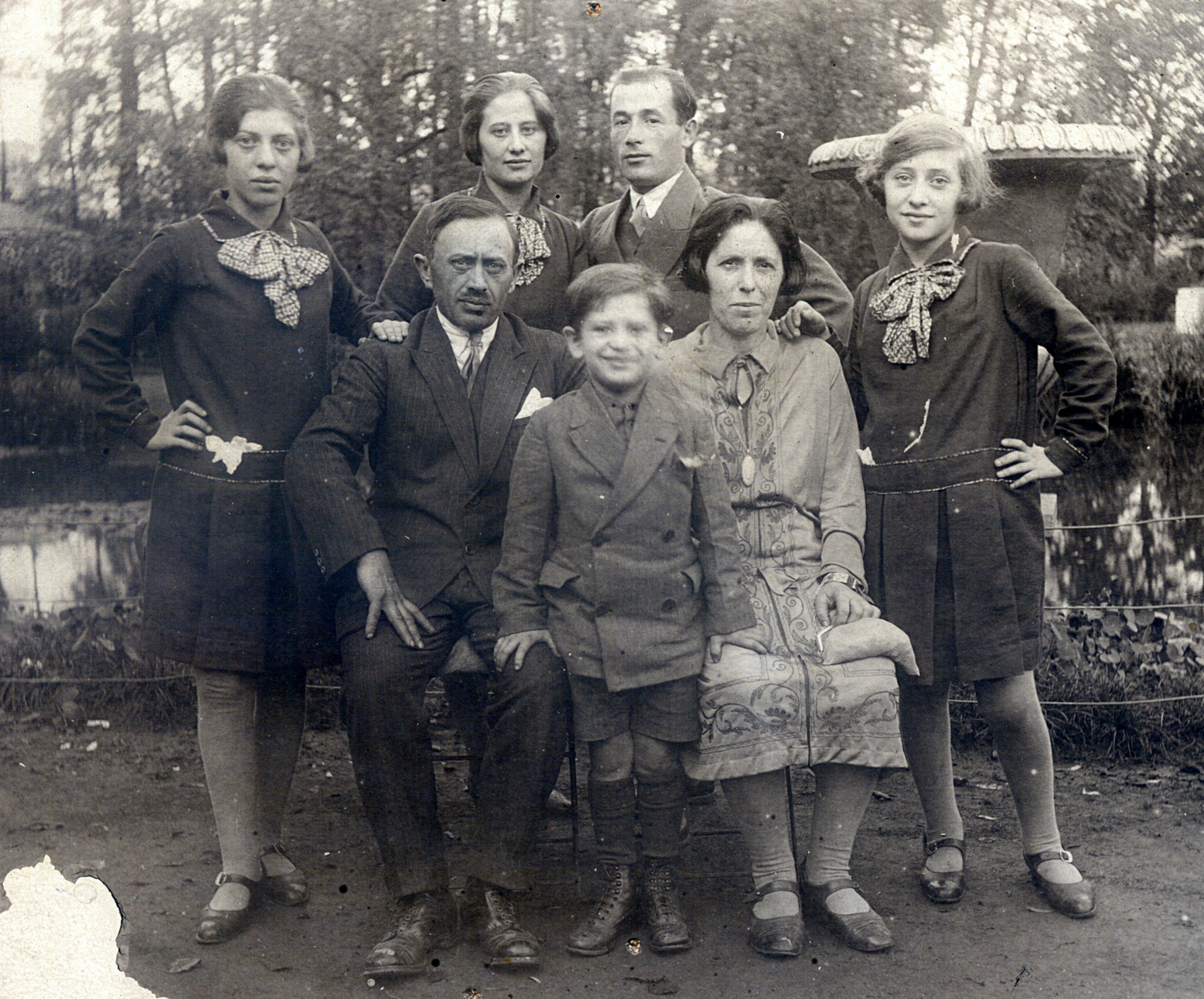
The Chapochnik-Zimmerman family in Marie-José Park, in Brussels, in 1929 - From left to right, standing: Feiga Saposnik, Basia Chapochnik, Itzic-Jancou Zimmerman and Jeanne Chapochnik. Sitting: Jean and David Chapochnik and Mathilde Zimmerman
Of the seven people on this photo taken at the end of the 1920s, three of them were still alive after the war. Two of them had survived deportation.
The Chapochnik-Zimmerman family emigrated from Romania between 1920 and 1922. Their names were entered in the register of Jews at the end of 1940. The majority of them lived in a working-class district of Brussels, where many Jews lived as well. Feiga Saposnik and her parents, Jean Chapochnik and Mathilde Zimmerman, lived in Rue des Tanneurs, while her aunt, Basia Saposnik and her husband, Itzic Iancou Zimmerman, lived nearby in Rue du Lavoir. Only Jeanne Chapochnik, her sister, had gone to live in Antwerp with her husband, Sylvain-David Goldstein. In view of the threats which Jews were facing, the family decided that it would be safer to go underground. The fugitive Jeanne Chapochnik was arrested in Northern France on 24 July 1942. She had broken the law applicable to Jews, by leaving the home where she was registered, and not wearing the compulsory yellow star. She got off lightly, sentenced only for breaching the German currency laws. She served her four month sentence first at Valenciennes and Lille in France, and then in the Saint-Gilles prison in Belgium, and finally in Forest. Because of a lack of communication between the German services, she was set free at the end of her sentence. On the other hand, David Chapochnik, likewise on the run was arrested near the demarcation line between Vichy and occupied France. Interned in the prison of Besançon, he was sent to the Sammellager in Drancy where he was deported on 4 November 1942 on Transport 40 from France, and disappeared forever. The other family members, who had remained in Belgium, avoided capture until May 1944. When they were arrested they were found to be in possession of forged identity papers. Taken to the Dossin Barracks on 17 May, five of them spent two days there before being deported on Transport 25. When the transport arrived at Birkenau, the father, Jean Chapochnik, 53 years old, and the mother, Mathilde Zimmerman, 51 years old, disappeared without a trace. Itzic Iancou Zimmerman, 40, Feiga Saposnik, 30, and Jeanne Chapochnik, 28, were all selected for work in the concentration camp. Itzic-Jancou Zimmerman, registration number 2.840, held until the death march of January 1945 which took him to Buchenwald. There, worn out, and terribly weakened, he died on 23 February 1945. Feiga was separated from her sister Jeanne. Identified at Auschwitz by registration number A 5,190, she was forced to work until November 1944. She was then transferred to Flossenburg’s Willischtal Kommando. In April 1945, Feiga was put on the death march to Theresienstadt, where she survived until the liberation of this ghetto in May 1945 by the Red Army. She returned to Belgium on 11 June. Her sister, Jeanne Chapochnik, returned on 24 May. Registered under number A 5,169, Jeanne was put to work in Birkenau. The death march of January 1945 took her to Bergen-Belsen, where she held out until the liberation of this camp on 15 April 1945, by the British Army. When she got back to Belgium, she learned that she was a widow. Her husband, Sylvain-David Goldstein, deported with her, never returned. She was nonetheless reunited with her sisters, Feiga and Basia. Basia although he she had been with the rest of the family was never deported.
